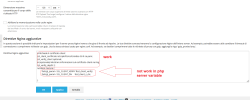server {
listen x.x.x.x:443 ssl;
http2 on;
server_name example.net;
server_name www.example.net;
server_name ipv4.example.net;
ssl_certificate /usr/local/psa/var/certificates/***;
ssl_certificate_key /usr/local/psa/var/certificates/***;
client_max_body_size 134217728;
# mailconfig
location ~* ^/autodiscover/autodiscover\.xml$ {
try_files $uri @mad;
}
location ~* ^(/\.well-known/autoconfig)?/mail/config\-v1\.1\.xml$ {
try_files $uri @mad;
}
location ~* ^/email\.mobileconfig$ {
try_files $uri @mad;
}
location @mad {
rewrite ^(.*)$ /mailconfig/ break;
proxy_pass http://127.0.0.1:8880;
proxy_set_header X-Host $host;
proxy_set_header X-Request-URI $request_uri;
}
# mailconfig
access_log "/var/www/vhosts/system/example.net/logs/proxy_access_ssl_log";
error_log "/var/www/vhosts/system/example.net/logs/proxy_error_log";
root "/var/www/vhosts/example.net/httpdocs";
#extension performance-booster begin
# Additional directives added by Plesk Optimization Settings
# Additional directives added by Plesk Optimization Settings
#extension performance-booster end
#extension sslit begin
#extension sslit end
#extension letsencrypt begin
location ^~ /.well-known/acme-challenge/ {
root /var/www/vhosts/default/htdocs;
types { }
default_type text/plain;
satisfy any;
auth_basic off;
allow all;
location ~ ^/\.well-known/acme-challenge.*/\. {
deny all;
}
}
#extension letsencrypt end
location ~ /\.ht {
deny all;
}
location ~ ^/(plesk-stat|awstats-icon|webstat|webstat-ssl|ftpstat|anon_ftpstat) {
auth_basic "Domain statistics";
auth_basic_user_file "/var/www/vhosts/system/example.net/pd/d..httpdocs@plesk-stat";
autoindex on;
location ~ ^/plesk-stat(.*) {
alias /var/www/vhosts/system/example.net/statistics/$1;
}
location ~ ^/awstats-icon(.*) {
alias /usr/share/awstats/wwwroot/icon/$1;
}
location ~ ^/(.*) {
alias /var/www/vhosts/system/example.net/statistics/$1;
}
}
location ~ ^/~(.+?)(/.*?\.php)(/.*)?$ {
fastcgi_read_timeout 120;
alias /var/www/vhosts/example.net/web_users/$1/$2;
fastcgi_split_path_info ^((?U).+\.php)(/?.+)$;
try_files $uri $fastcgi_script_name =404;
fastcgi_param PATH_INFO $fastcgi_path_info;
fastcgi_pass "unix:/var/www/vhosts/system/example.net/php-fpm.sock";
include /etc/nginx/fastcgi.conf;
}
location ~ \.php(/.*)?$ {
fastcgi_read_timeout 120;
fastcgi_split_path_info ^((?U).+\.php)(/?.+)$;
try_files $uri $fastcgi_script_name =404;
fastcgi_param PATH_INFO $fastcgi_path_info;
fastcgi_pass "unix:/var/www/vhosts/system/example.net/php-fpm.sock";
include /etc/nginx/fastcgi.conf;
}
index "index.php" "index.html" "index.cgi" "index.pl" "index.xhtml" "index.htm" "index.shtml";
disable_symlinks if_not_owner "from=/var/www/vhosts/example.net";
add_header X-Powered-By PleskLin;
include "/var/www/vhosts/system/example.net/conf/vhost_nginx.conf";
}

